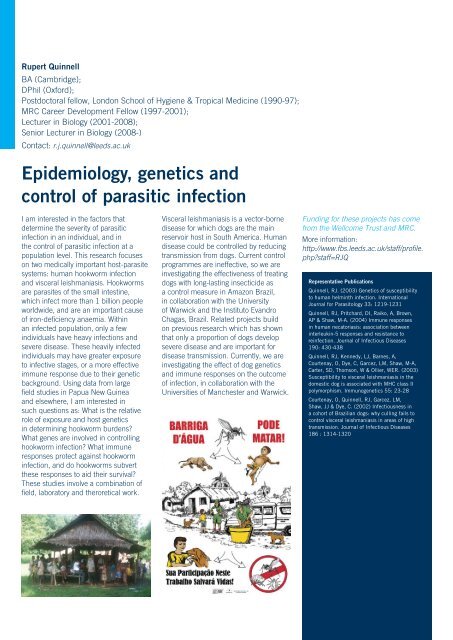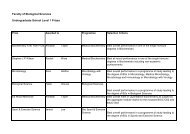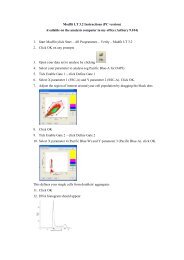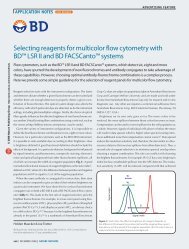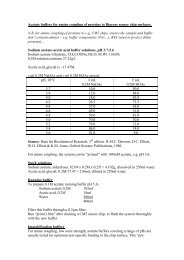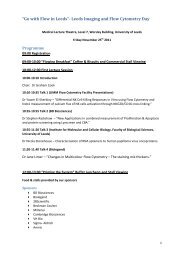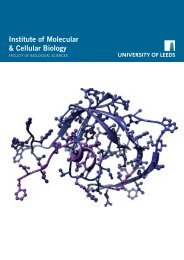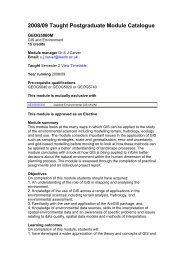3649-08 IICB.indd - Faculty of Biological Sciences - University of ...
3649-08 IICB.indd - Faculty of Biological Sciences - University of ...
3649-08 IICB.indd - Faculty of Biological Sciences - University of ...
Create successful ePaper yourself
Turn your PDF publications into a flip-book with our unique Google optimized e-Paper software.
Rupert Quinnell<br />
BA (Cambridge);<br />
DPhil (Oxford);<br />
Postdoctoral fellow, London School <strong>of</strong> Hygiene & Tropical Medicine (1990-97);<br />
MRC Career Development Fellow (1997-2001);<br />
Lecturer in Biology (2001-20<strong>08</strong>);<br />
Senior Lecturer in Biology (20<strong>08</strong>-)<br />
Contact: r.j.quinnell@leeds.ac.uk<br />
Epidemiology, genetics and<br />
control <strong>of</strong> parasitic infection<br />
I am interested in the factors that<br />
determine the severity <strong>of</strong> parasitic<br />
infection in an individual, and in<br />
the control <strong>of</strong> parasitic infection at a<br />
population level. This research focuses<br />
on two medically important host-parasite<br />
systems: human hookworm infection<br />
and visceral leishmaniasis. Hookworms<br />
are parasites <strong>of</strong> the small intestine,<br />
which infect more than 1 billion people<br />
worldwide, and are an important cause<br />
<strong>of</strong> iron-deficiency anaemia. Within<br />
an infected population, only a few<br />
individuals have heavy infections and<br />
severe disease. These heavily infected<br />
individuals may have greater exposure<br />
to infective stages, or a more effective<br />
immune response due to their genetic<br />
background. Using data from large<br />
field studies in Papua New Guinea<br />
and elsewhere, I am interested in<br />
such questions as: What is the relative<br />
role <strong>of</strong> exposure and host genetics<br />
in determining hookworm burdens?<br />
What genes are involved in controlling<br />
hookworm infection? What immune<br />
responses protect against hookworm<br />
infection, and do hookworms subvert<br />
these responses to aid their survival?<br />
These studies involve a combination <strong>of</strong><br />
field, laboratory and theroretical work.<br />
Visceral leishmaniasis is a vector-borne<br />
disease for which dogs are the main<br />
reservoir host in South America. Human<br />
disease could be controlled by reducing<br />
transmission from dogs. Current control<br />
programmes are ineffective, so we are<br />
investigating the effectiveness <strong>of</strong> treating<br />
dogs with long-lasting insecticide as<br />
a control measure in Amazon Brazil,<br />
in collaboration with the <strong>University</strong><br />
<strong>of</strong> Warwick and the Instituto Evandro<br />
Chagas, Brazil. Related projects build<br />
on previous research which has shown<br />
that only a proportion <strong>of</strong> dogs develop<br />
severe disease and are important for<br />
disease transmission. Currently, we are<br />
investigating the effect <strong>of</strong> dog genetics<br />
and immune responses on the outcome<br />
<strong>of</strong> infection, in collaboration with the<br />
Universities <strong>of</strong> Manchester and Warwick.<br />
Funding for these projects has come<br />
from the Wellcome Trust and MRC.<br />
More information:<br />
http://www.fbs.leeds.ac.uk/staff/pr<strong>of</strong>ile.<br />
php?staff=RJQ<br />
Representative Publications<br />
Quinnell, RJ. (2003) Genetics <strong>of</strong> susceptibility<br />
to human helminth infection. International<br />
Journal for Parasitology 33: 1219-1231<br />
Quinnell, RJ, Pritchard, DI, Raiko, A, Brown,<br />
AP & Shaw, M-A. (2004) Immune responses<br />
in human necatoriasis: association between<br />
interleukin-5 responses and resistance to<br />
reinfection. Journal <strong>of</strong> Infectious Diseases<br />
190: 430-438<br />
Quinnell, RJ, Kennedy, LJ, Barnes, A,<br />
Courtenay, O, Dye, C, Garcez, LM, Shaw, M-A,<br />
Carter, SD, Thomson, W & Ollier, WER. (2003)<br />
Susceptibility to visceral leishmaniasis in the<br />
domestic dog is associated with MHC class II<br />
polymorphism. Immunogenetics 55: 23-28<br />
Courtenay, O, Quinnell, RJ, Garcez, LM,<br />
Shaw, JJ & Dye, C. (2002) Infectiousness in<br />
a cohort <strong>of</strong> Brazilian dogs: why culling fails to<br />
control visceral leishmaniasis in areas <strong>of</strong> high<br />
transmission. Journal <strong>of</strong> Infectious Diseases<br />
186 : 1314-1320


